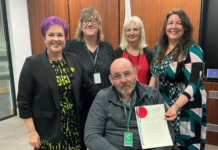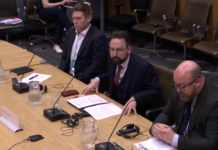My name is Josh and I am CETMA’s Disability Champion. I’m 25, and have a couple of Additional Needs (disabilities). I have Cerebral Palsy, and multiple sensory impairments.
A friend recently asked me why I love my job as CETMA’s Disability Champion, and it really got me thinking. There are a number of reasons why I really like this job, and even more reasons why I feel it is important for organisations to have a role like Disability Champion. I will address why I think it is important, before I start explaining why I personally love doing the job.
It is so important for organisations to be accessible, both in their physical locations, and in the services and resources they provide.
The Equality Act was passed and came into force in 2010. The law aimed to protect people who fall under several Protected Characteristics, from many forms of discrimination. One of these Protected Characteristics is disability.
According to the Equality Act (2010) itself, discrimination is when someone treats you differently (usually in a negative way) based on who you are or something you have. These are things that are beyond your control, so it is not fair that you are treated negatively because of them.
Since the Equality Act (2010) came into force, there has been a huge shift in the amount and types of organisations that want to become more mindful of mistreating people who have Additional Needs, both purposely and accidentally.
Although definitely a step in the right direction, the importance that was placed on the implications of being discriminatory, led to a lot of organisations being fearful, and wanting to avoid breaking the law. Some say that this valid concern is distracting organisations from the ambition of actually being ‘disability-friendly’.
Having someone in a similar role to Disability Champion, can help organisations become more intrinsically accessible. It is important that someone leads the conversation on how organisations can become more accessible to people who are often marginalised, and who better (to lead the conversation than) someone who understands the challenges that people who have Additional Needs face?
The earlier this conversation is started from an organisation or project/service’s inception, the easier it will be for them to become intrinsically accessible. This is because, they can design things from the outset with accessibility in mind. It will also be easier because there will be no long-standing processes or culture to deconstruct and redesign.
It is also worth noting, that if something is accessible to people who have Additional Needs, then it will often make it easier for everyone. A great example of this is ‘Easy-Read’ versions of paperwork or publications.
An ‘Easy-Read’ version is essentially a type of a document that has simplified language and/or accompanying pictures that add context.
They were originally conceived to make things easier for people who are neurodivergent or have a condition such as dyslexia. However, people who have a visual impairment may also find it difficult to read large chunks of text, and find that it is much easier to read something if It is an ‘Easy-Read’ version.
I will now explain why I love being CETMA’s Disability Champion. Please understand that some of the reasons are influenced by my own personal experiences, which may be different from someone else who has Additional Needs.
One reason why I really like being in the role, is because I get to use my own lived experiences to help CETMA ensure that their projects are designed to be accessible from the beginning, to people who have different Additional Needs.
I also like the job because I get to use what I learned when I started my Foundation Degree in Social Care Studies. A number of its Modules were about elements that are fundamental to advocacy.
Part of my job involves using what I learned during those modules, to put myself into other people’s shoes, who have different Additional Needs to my own.
I can then look at things from their perspective and think about what people might struggle to read and/or access. I then think about ways to make the projects or project information easier to read. This is something that I really like doing.
I really enjoy doing this job because I get to make a difference and help people be included in community information in a way that they might not be able to be otherwise.
I love it when I get to explain my job to people. I sometimes get the impression that some people do not expect me to have employment, let alone employment where I can actually make a difference. Explaining my job to anyone who asks is just one way I can personally contribute to the dispelling of this misconception.
Unfortunately, some people still believe that people who have Additional Needs can not really contribute to society, and just exist and can’t really do anything of value. This belief is frustrating at the best of times, and harmful at it’s worst.
Over the years, there have been many campaigns and movements with the aim to dispel this misconception, and demonstrate just what people who have Additional Needs can bring to the world and society. One of the most notable of the years is the ‘Purple Pound’ campaign.
According to the disability information website Purple: Changing the Conversation, ‘Purple Pound’ is a term used to describe the amount of money that is spent by disabled people.
The term was invented in order to help people realise how much disabled people actually contribute towards the economy, and to help counter the misconception still held by some people that all we do is drain it, or at least hold it back.
I know it is on a small scale, but I love the fact that I get to show others what people who have Additional Needs can bring to society. Sometimes, in simply trying to live our lives, we can see ways to make things easier, and these accessibility improvements could potentially make it fairer for everyone.
To finish, I just wanted to say that organisations should not be afraid of asking how they can become more accessible to people who have Additional Needs. We appreciate that you have the right intentions, and we want to help. We also appreciate that you are actually asking and trying to listen, as opposed to just guessing, and potentially putting more barriers in place.
Help keep news FREE for our readers
Supporting your local community newspaper/online news outlet is crucial now more than ever. If you believe in independent journalism, then consider making a valuable contribution by making a one-time or monthly donation. We operate in rural areas where providing unbiased news can be challenging. Read More About Supporting The West Wales Chronicle






















